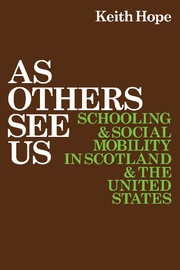Book contents
- Frontmatter
- Contents
- Acknowledgments
- Introduction
- 1 Scotland: A meritelective system?
- 2 Comparison of Scotland with England and Wales
- 3 Comparison of Scotland with the United States
- 4 IQ + effort = merit
- 5 The institutions of managed meritelection
- 6 Was selection carried out fairly?
- 7 Meanings of key terms
- 8 Does deprivation affect life chances?
- 9 Market situation
- 10 Intelligence and occupational mobility
- 11 Intelligence and vertical mobility
- 12 Scottish society
- 13 Understanding other people's norms
- 14 Merit or desert?
- Notes
- References
- Index
1 - Scotland: A meritelective system?
Published online by Cambridge University Press: 05 February 2012
- Frontmatter
- Contents
- Acknowledgments
- Introduction
- 1 Scotland: A meritelective system?
- 2 Comparison of Scotland with England and Wales
- 3 Comparison of Scotland with the United States
- 4 IQ + effort = merit
- 5 The institutions of managed meritelection
- 6 Was selection carried out fairly?
- 7 Meanings of key terms
- 8 Does deprivation affect life chances?
- 9 Market situation
- 10 Intelligence and occupational mobility
- 11 Intelligence and vertical mobility
- 12 Scottish society
- 13 Understanding other people's norms
- 14 Merit or desert?
- Notes
- References
- Index
Summary
The boys we are about to study entered the world under inauspicious circumstances. In 1936, infant mortality in Glasgow was two or three times as high as that in many other urban areas; it even exceeded that in Tokyo, Buenos Aires, and Montevideo. Many of our sample members were reared in one- and two-room dwellings, in high, massively constructed tenements which were insanitary to a degree known only in rural areas of England. Wheatley's Housing Act of 1924, which was the one great success of the first two minority Labour administrations, had little effect in Scotland. “It offered houses too good and at too high a rent for Scottish habits.”
In the latter half of the eighteenth century, Edinburgh had been in the van of intellectual activity in Europe. In the first half of the nineteenth century, the Edinburgh Review played a leading role in forming the political consciousness of England. By the end of the nineteenth century, the engineering skills and inventiveness of Clydeside had brought Scottish wages up to English levels. Scotland supplied the Union with a disproportionate number of prime ministers, and in the twenties Clydeside returned a solid phalanx of Independent Labour party members to Parliament. In fact, the impact of Scotland on British politics and intellectual life had been out of all proportion to its the size and wealth. But by the thirties Scotland was in a deep malaise of unemployment, poverty, and parochialism.
- Type
- Chapter
- Information
- As Others See UsSchooling and Social Mobility in Scotland and the United States, pp. 5 - 34Publisher: Cambridge University PressPrint publication year: 1985



